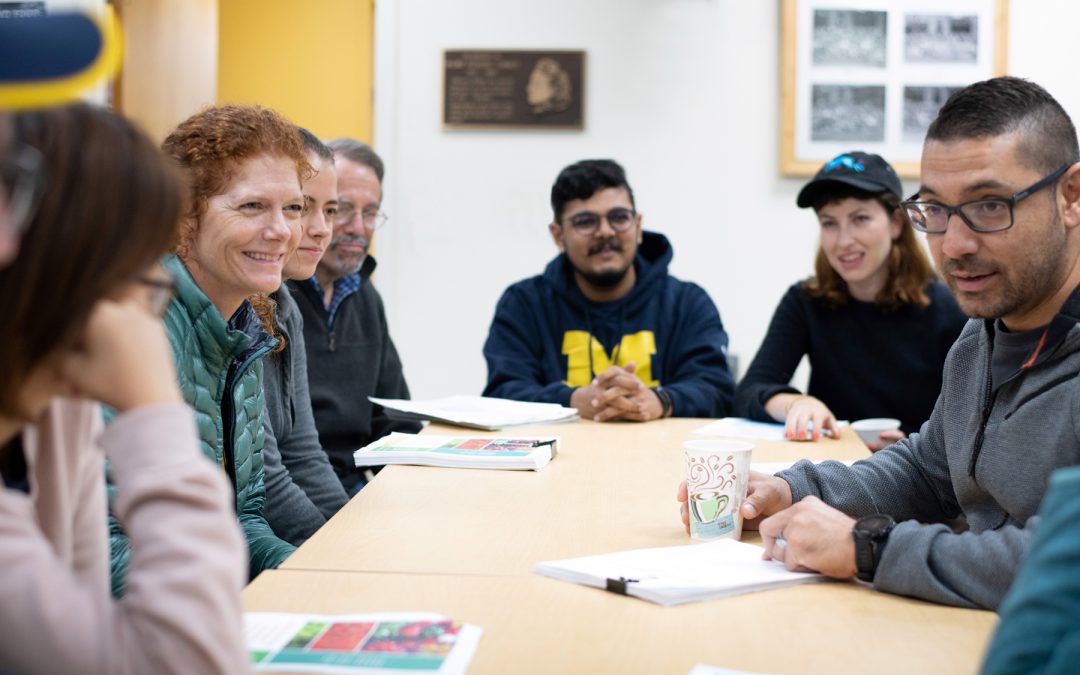Rackham Graduate School is launching four Mcubed Diamond projects aimed at driving innovation in both master’s and doctoral education at the University of Michigan. These projects will play a critical role in the implementation of Rackham’s Strategic Vision for Graduate Education, a multi-year plan for reimagining graduate education to emphasize holistic, student-centered training.
Composed of faculty members from across U-M, the interdisciplinary project teams will tackle topics including graduate-student advisory committees, graduate-student mental health, and student-centered models for both master’s and doctoral education.
“As we move forward with our strategic vision, it’s important that we do so using evidence-based, innovative practices,” says Dean Mike Solomon. “These four projects embody the approach to rethinking graduate education that will define the coming years here at Rackham.”
Mentoring in STEM
One of the most foundational elements of doctoral education, particularly in the STEM fields, is mentoring, both between a student and their faculty advisor and between the student and their thesis advisory committee. While a great deal of emphasis has historically been placed on the student-advisor relationship, comparatively little in the way of explicit mentoring responsibilities has been established for the committees. This is something researchers hope to change in the project Next-Gen Mentoring Committees—Employing Thesis/Advisory Committees as a Defined Framework for STEM Mentoring and Advocacy.
In this project, Mary O’Riordan and Michele Swanson, associate professor and professor in the Department of Microbiology and Immunology, respectively, and Mary-Ann Mycek, professor in the Department of Biomedical Engineering and associate dean for graduate education in the College of Engineering, aim to transform the traditional thesis advisory committee into a strong, consistent mentoring network for graduate students. Over the course of the project, the team will explore the impact of four key changes to these committees—allowing the student to collaborate on choosing committee members with their advisor, having someone other than the advisor chair the committee, empowering one committee member to serve as an advocate for the student, and dedicating time at each committee meeting to discuss the student’s career and professional goals.
A New Approach to the Studio Model
In contrast to the STEM fields, graduate education in the arts, design, and architectural fields often takes a more decentralized “studio” approach. Relying more on one-on-one instruction and collaboration between students, this model is meant to stimulate creativity, critical thinking, and contemplation. Utilizing a new space and organization—the Center for Inequality Dynamics—the project Redesigning the Graduate Student Experience: Testing a New Interdisciplinary Approach to the Studio Model will seek to apply this same model to the social sciences and beyond.
The research team, comprised of Fabian Pfeffer and Felichism Kabo, associate professor and assistant research scientist in the Institute for Social Research (ISR), respectively, and Kathy Velikov, associate professor in the Department of Architecture, will bring together a team of students and postdoctoral fellows from the Taubman College of Architecture and Urban Planning to design and build modular, movable furniture capable of being reconfigured to support co-working and collaboration in a variety of group sizes, presentation formats, and technology needs. As the furniture and space are utilized by social-science graduate students, ISR faculty will empirically analyze their behavior, experience, and outcomes through interviews, observation, and location-tracking data in order to assess the model’s effectiveness.
Master’s and Mastery
Improving outcomes for master’s students depends directly on the skills and competencies they build during their programs of study. The project Toward Mastery: Re-envisioning Master’s Student Learning Through a Competency-Based and Multi-Mentoring Approach looks to reorient master’s education at U-M around that very idea.
Bringing together Michaela Zint, associate dean for academic affairs in the School for Environment and Sustainability (SEAS); Angela Beck, assistant dean for student engagement and practice in the School of Public Health; and Paula Lantz, associate dean for academic affairs in the Ford School of Public Policy, the project will support a fundamental shift from faculty-centered to student-centered master’s education. They aim to achieve this by developing ways to create curricula, institutional systems, and other learning opportunities that all align with building the competencies of students in their programs. SEAS will serve as a case study for piloting techniques and systems developed by the project team.
Graduate-Student Mental Health
The bedrock of graduate education is, and always has been, the graduate students themselves, yet recent studies show that 32 percent of graduate students are at risk for common mental-health problems like depression and anxiety. As this trend continues to rise, once underused university resources like counseling centers are becoming overwhelmed. Through the project Understanding Graduate Student Perspectives of Mental Health, the research team hopes to arrive at a better understanding of the factors driving these patterns from the students’ own perspectives.
The project team is comprised of Kentaro Toyama, W.K. Kellogg Associate Professor of Community Information; Robert Adams, professor in the Taubman College of Architecture and Urban Planning; and Daniel Eisenberg, research professor in the Institute for Social Research. Adams and Eisenberg are also members of the Rackham Graduate-Student Mental-Health Task Force. Through student input, they are looking for answers to questions related to how graduate students perceive the stigmas around mental-health issues, how impostor syndrome impacts their health and studies, how they view university responses to mental-health challenges, and what kinds of solutions to these issues they view as important. The long-term goal of this effort is to identify ways that graduate programs can address student mental-health issues that are both medically sanctioned and student centered.
“Through the Rackham Mcubed Diamond Program, our school supports and promotes research, interventions, and new programs centered on innovation in graduate education,” Valeria Bertacco, associate dean for physical sciences and engineering, says. “It is a perfect vehicle to cross-pollinate different practices throughout the broad range of disciplines at our institution, and it has drawn a large interest across multiple campuses, and many graduate programs. We are very excited about the creativity of ideas that have emerged through the Mcubed Diamond Program.”
For more on these projects and on the Diamond program, please visit Mcubed.

